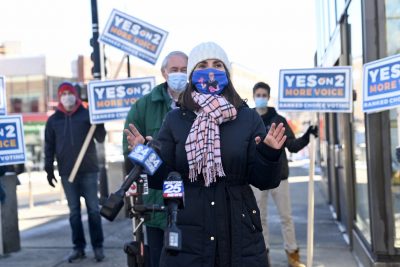Voters approved Question 1 on the Massachusetts ballot Tuesday, passing a bill that would enable vehicle owners and independent repair shops to obtain more access to car data. Question 2, which would have implemented ranked-choice voting statewide, failed.

QUESTION 1
Question 1 asked voters whether an addition should be made to the state’s 2012 “right to repair” law. The passed bill will mandate the telematics systems of cars sold in Massachusetts be made open-source, permitting independent repair shops and consumers to access vehicles’ diagnostic data beginning in 2022.
Car manufacturers, under this law, will be barred from mandating car owners or independent repair shops get their permission before accessing the mechanical data of a car, allowing consumers to freely bring their vehicles to independent shops. Currently, owners need approval from the manufacturer for an independent shop to make repairs.
Proponents argue the law is a matter of expanded and more efficient access to information for independent repair shops.
Tommy Hickey, director of the Massachusetts Right to Repair Coalition, said the ballot measure’s approval hands control to consumers themselves regarding the sharing of their cars’ information.
“This would make the car owner the gatekeeper of their wireless diagnostic and repair information,” Hickey said. “Consumers prefer to go to independent repair shops about 75 percent of the time, and this will allow them to have the ability to do that.”
However, opponents claim the law would pose an unnecessary threat to drivers’ data privacy.
Conor Yunits, a spokesperson for the Coalition for Safe and Secure Data, told The Daily Free Press in late September this policy would also grant third parties access to GPS data and emergency response data.
Yunits added that repair shops are already able to access diagnostic data via a wired connection to the car.
Hickey, however, said wireless transmission will make sharing information more efficient. Since 1996, diagnostic data has traditionally been accessible through an on-board diagnostics port, but this method is losing traction, he said.
“We’re moving away from the OBD port,” Hickey said. “That OBD port is becoming wireless, so through a mobile app on your phone or through the dashboard of your 2022 car, you would be able to share that information with an independent repairer.”
This law will make telematics data available on a mobile app, so all vehicle owners and repair shops have open access to data from all car models made in 2022 or later.
But Yunits said this openness will render vehicles more vulnerable to hacking.
The National Highway Safety Traffic Safety Administration stated in a July letter to U.S. congressional leaders that manufacturers would be unable to follow federal guidance and maintain cybersecurity measures if the initiative passed.
Projections from earlier in the week showed 75 to 80 percent of Massachusetts voters would cast their ballots in favor of the bill, according to Hickey.
The right to repair will also require the Commonwealth’s attorney general to provide information to vehicle owners and lessees about telematics systems, according to the state information packet on Tuesday’s ballot questions.
Although it may require efforts by the Commonwealth to educate prospective and current car owners on new rules, the law will pose no fiscal consequences on the government as a result of its passing, according to the Massachusetts Secretary of State.
QUESTION 2
Massachusetts residents also voted on whether to pass ranked-choice voting in the state. The bill, which failed, would have implemented a ranked-choice system of voting for primary and general elections starting in 2022.
If the bill had passed, the Secretary of State would have been responsible for issuing regulations and educating voters about the new process, according to the ballot questions packet.
RCV would not apply in elections for president, county commissioner or regional district school committee members.
In the proposed ranked-choice system, voters express their relative support for candidates by ordering them on the ballot rather than voting for a single candidate.
One candidate must receive more than 50 percent of the vote to win the election. If 50 percent of the vote is not immediately won by any one candidate, voter choice begins to make up extra percentage points.
If other rounds are required, candidates are eliminated from the race based on who received the fewest first-choice votes. If a voter chose an eliminated candidate as their first choice, their second-choice candidate would move up into first place.
A tie for last place in any round is broken by comparing the tied candidates’ support in previous rounds.
Cambridge is among more than 20 municipalities in the country that has adopted some form of RCV. Nearby Maine also voted to implement RCV statewide in 2018 — making it the first state to use the method in a presidential election.
Paul Craney, a spokesperson for Massachusetts Fiscal Alliance, which opposed RCV, said the system creates a “fake majority.”
Craney also said although some claim RCV eliminates disparaging campaign rhetoric, this belief has historically proven false.
Mudslinging tactics continued in Maine the same year it implemented RCV, Craney said, but this type of campaigning was conducted by Super PACs instead of the candidates themselves.
“Under ranked choice, it just means someone else does the negative campaigning,” Craney said. “If you think it’s important that candidates don’t go negative with each other, fine, but don’t think that under ranked choice it won’t happen.”
However, proponents argue ranked-choice systems do give greater weight to independent candidates.
Evan Falchuk, a 2014 independent candidate for Massachusetts governor, said voters are already used to ranking options because they do so frequently in their daily lives.
“We hear a lot from voters that they feel like they have to hold their nose and vote for the lesser of two evils,” Falchuk told The Daily Free Press in October. “One thing ranked-choice voting does is it levels the playing field.”
















































































































